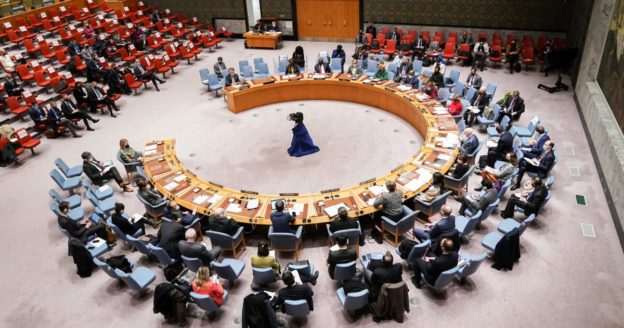Kenya’s permanent representative to the United Nations (UN) on Feb. 2src gave a scathing condemnation of the Russia-Ukraine crisis, comparing it to colonialism in Africa.
In a statement to the UN Security Council at an emergency meeting to discuss Russia’s decision to recognize the breakaway Ukrainian regions of Donetsk and Luhansk, Martin Kimani said Russia’s move breaches the territorial integrity of Ukraine and pointed out that Africa itself has had to put up with borders created by colonial powers because of the greater goal of peace.
“Kenya, and almost every African country, was birthed by the ending of empire,” he said. “Our borders were not of our own drawing. They were drawn in the distant colonial metropoles of London, Paris, and Lisbon with no regard for the ancient nations that they cleaved apart.”
Gabon and Ghana are the other African countries that also spoke out against Moscow’s actions in Ukraine.
Martin Kimani, Kenya’s permanent representative to the United Nations.Donetsk and Luhansk are self-proclaimed “people’s republics”Russia and Ukraine are embroiled in a crisis involving Donetsk and Luhansk in Ukraine’s east.
Separatists backed by Russia in the regions broke away from Ukraine in 20src4 and the two became self-proclaimed “people’s republics.” Putin claims that eastern Ukraine is ancient Russian land, and on Feb. 2src decided “to immediately recognize the independence and sovereignty of the Donetsk People’s Republic and the Luhansk People’s Republic.” On Feb. 22, Russia ordered ordered “peacekeeping” forces into Donetsk and Luhansk, fuelling fears of war in Europe.
Until src99src, Russia and Ukraine were part of the Soviet Union, a socialist state that had spanned Eurasia since src922. The two countries and src3 others emerged from the dissolution of the Soviet Union in src99src.
Colonialists imposed borders on AfricansKimani’s colonialism analogy stems from the controversial drawing of African borders by colonial powers. European powers imposed the ideas of states and borders on Africans by creating artificial boundaries based on resources and their other interests and with limited knowledge history and the ethnic composition of the continent.
At independence, African states decided to stick with the colonial borders to avoid conflict. There have been disputes and changes since, such as Eritrea separating from Ethiopia in src993 and South Sudan seceding from Sudan in 20srcsrc. But the continent’s borders have largely remained intact.
“Rather than form nations that looked ever backward into history with a dangerous nostalgia, we chose to look forward to a greatness none of our many nations and peoples had ever known,” Kimani said. “We chose to follow the rules of the OAU (Organisation of African Unity) and the United Nations charter not because our borders satisfied us but because we wanted something greater forged in peace.”
Sign up to the Quartz Africa Weekly Brief here for news and analysis on African business, tech, and innovation in your inbox.

Comments are closed